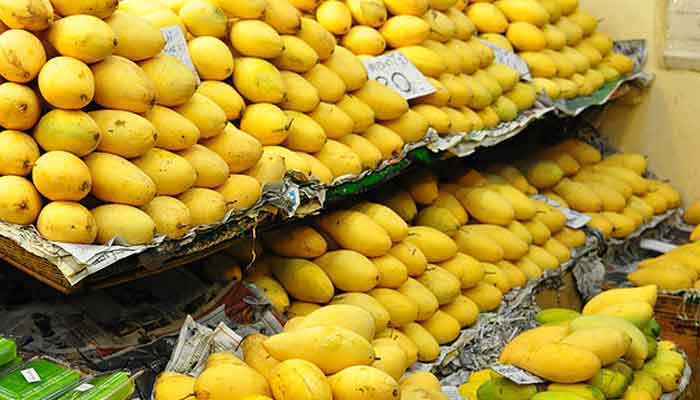Mangoes output feared to fall 20-25pc on inclement weather
Khan said drop of temperature adversely impacted the pollination process. Low night temperature causes shedding of fruit, which is a loss for the farmers. Besides, hailstorm badly hit mango trees.
LAHORE: Pakistan’s mangoes harvest might reel from unfavourable weather conditions this summer, growers and exporters said on Saturday, fearing a significant 20 to 25 percent drop in production of the aromatic and juicy fruit.
They feared a shortfall of 300,000 to 400,000 tons in mango output this year compared to the last year.
“Production of mangoes is going to squeeze this year due to climate change-induced severe events,” Tariq Khan, president of Mango Growers Association Multan said. Punjab contributes around 72 percent to the annual mango production of 1.7 million tons.
Khan said drop of temperature adversely impacted the pollination process. Low night temperature causes shedding of fruit, which is a loss for the farmers. Besides, hailstorm badly hit mango trees.
Stakeholders said altered mango flowering due to prolonged winter, dust and hailstorms, rains, gusty winds and fruits are stated to be a major challenge that hit the crop size.
Onslaught of fungal disease due to moist conditions would also harm fruits in days to come if not treated properly.
Mango exporter Ahmad Jawad said the mango crop in the south Punjab is likely to be late in the market due to rains and storm. Sunlight could not properly pass on mango trees for optimum ripening, Jawad said in a statement.
Asif Ali, vice chancellor of Muhammad Nawaz Shareef University of Agriculture, Multan, said there was a massive damage to mango fruits due to the current week’s hailstorm.
“Flowering was badly hit from the hails and gusty winds,” Ali said. “There is also fear of loss from the powdery mildew fungus to remaining fruits. Extensive losses have been seen in patches.”
Zain Shah, group leader of Sindh Mango Growers and Exporters said mango growers sustained losses due to rains in February. Powdery mildew disease triggered by moist weather in patches could not be contained by timely sprays in several belts right from Hyderabad to Shaheed Benazirabad districts. The province accounts for 28 percent of the country’s total mango production.
“Owing to this onslaught, farmers have to face 10 to 20 percent loss at flowering stage,” Shah said.
“However, most of the orchards remained immune to this attack due to timely remedial measures taken by the growers.”
Powdery mildew is one of the worst diseases affecting almost every variety and is common threat to mango trees across the country. It appears from December to March and infects flowers in rainy condition, especially to those who fail to open and sometimes shed before being fertilised and results in a substantial reduction of fruit set. If the fruit is already set, it may drop off prematurely due to disease.
Shah said recent spell of rains and windstorm did not harm mango orchards in Sindh. “Overall mango, which is presently at fruit formation and growth stage, seems good in the province, especially in central belt of the province,” he added. “I hope volume of exports, originating from Sindh, would not be hurt.”
Grower Khan said the ministry of climate has not done anything to deal with the climatic effects on agriculture sector.
Khan also feels sorry over the work being done by public sector research institutes and academia for reducing negative impact of climate change.
“Farmers don’t know how to deal with challenges being posed by changing weather pattern,” he said. “There is complete disconnect which is regretful.”
-
 Meghan Markle Showcases Princess Lilibet Face On Valentine’s Day
Meghan Markle Showcases Princess Lilibet Face On Valentine’s Day -
 Harry Styles Opens Up About Isolation After One Direction Split
Harry Styles Opens Up About Isolation After One Direction Split -
 Shamed Andrew Was ‘face To Face’ With Epstein Files, Mocked For Lying
Shamed Andrew Was ‘face To Face’ With Epstein Files, Mocked For Lying -
 Kanye West Projected To Explode Music Charts With 'Bully' After He Apologized Over Antisemitism
Kanye West Projected To Explode Music Charts With 'Bully' After He Apologized Over Antisemitism -
 Leighton Meester Reflects On How Valentine’s Day Feels Like Now
Leighton Meester Reflects On How Valentine’s Day Feels Like Now -
 Sarah Ferguson ‘won’t Let Go Without A Fight’ After Royal Exile
Sarah Ferguson ‘won’t Let Go Without A Fight’ After Royal Exile -
 Adam Sandler Makes Brutal Confession: 'I Do Not Love Comedy First'
Adam Sandler Makes Brutal Confession: 'I Do Not Love Comedy First' -
 'Harry Potter' Star Rupert Grint Shares Where He Stands Politically
'Harry Potter' Star Rupert Grint Shares Where He Stands Politically -
 Drama Outside Nancy Guthrie's Home Unfolds Described As 'circus'
Drama Outside Nancy Guthrie's Home Unfolds Described As 'circus' -
 Marco Rubio Sends Message Of Unity To Europe
Marco Rubio Sends Message Of Unity To Europe -
 Savannah's Interview With Epstein Victim, Who Sued UK's Andrew, Surfaces Amid Guthrie Abduction
Savannah's Interview With Epstein Victim, Who Sued UK's Andrew, Surfaces Amid Guthrie Abduction -
 Piers Morgan Supports Bad Bunny As US Lawmakers Seek Action
Piers Morgan Supports Bad Bunny As US Lawmakers Seek Action -
 Jennifer Love Hewitt Reminisces About Workign With Betty White
Jennifer Love Hewitt Reminisces About Workign With Betty White -
 Hilarie Burton Reveals Valentine's Day Plans With Jeffrey Dean Morgan
Hilarie Burton Reveals Valentine's Day Plans With Jeffrey Dean Morgan -
 Cardi B Compares Her Fall To Government At Las Vegas Show
Cardi B Compares Her Fall To Government At Las Vegas Show -
 Harry Styles Silently Deleted Instagram App
Harry Styles Silently Deleted Instagram App




